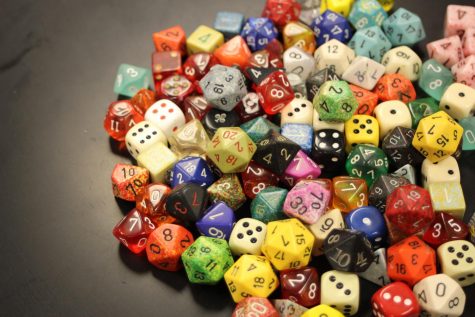Dungeons and Dragons Rolls into Susky
October 24, 2018
The D&D Club began only recently, but it already has a plethora of members signed up and a big campaign planned.
D&D is an acronym for “Dungeons and Dragons,” the name of the popular fantasy role-playing game.
D&D is a lot like a video game; players make a character and then navigate a make-believe world.
Unlike a video game, D&D players are not limited to a specific set of actions.
Instead of multiple-choice, D&D is open-ended, so players decide what their characters say and do. The possibilities are wild and endless.
The Dungeon Master senior Hunter Landis enjoys the freedom the game presents.
“You can do literally anything,” said Landis.
The club was started by senior Joshua Hartsock, the club’s president.
Most of D&D Club’s active senior members were in on the creation, as the idea was brought up after a D&D session in a campaign they were all a part of.
Hartsock thought a D&D club would be a good idea because it would be easier for everyone to gather and would make D&D more accessible to people who want to try it out.
From there, the process to get the club started was simple, and the idea was approved in two days.
The game is run by a ‘Dungeon Master,’ or a DM for short; they tell the story and decide what the players can do and where they can go.
A DM’s position is pivotal, as they build the world the party lives in, whether they are writing the story themself or reading it out of a book.
The D&D club’s campaign is a combination of the two, taking both original ideas and stories from the manual and combining them together.
Landis is one of the DM’s, and senior Christian Collins is the other.
Because there were so many members, the club opted to split into two separate groups with a different DM but the same story.
Simply put, D&D is a role-playing game, meaning the players take on the role of imaginary characters and go on quests and adventures refereed by the DM.
The effectiveness of a players’ actions is decided by their characters’ statistics, backstory and class.
A lot of coordination goes into making a character, as the D&D experience hinders on your playing style.
If a player is drawn to an action style game they could play a warrior class, a strong race and they could put all of their statistics into strength.
If a player is interested in magic, they could play a wizard, a fantasy race, and spend the game building up their spell proficiency.
The game is easily customizable, and there is something for everyone.
The importance is to find what suits each person so that learning to be their character will be as fun for them as possible.
More important than any character building, however, is the roll of a 20 sided dice, the game’s famous symbol.

Players decide what they want their character to do in any given situation, but the dice ultimately creates the outcome.
If someone rolls a 20, the highest number one can get, then they do whatever they sought out to do with expertise.
If they roll a 1 however, either punishment or hilarity can ensue.
Say they try to run away from a fight and roll a one, maybe either the character accidentally runs directly into a mob of monsters as punishment, or they try to run but trip over their own feet and fall flat.
A balance between slapstick and hardship is the key to an enjoyable game; people won’t want to play if the character dies every time there is a roll below a 15.

Photo by Addotta
Sophomore Sam Timlin explains that though a little complicated, D&D is an extremely fun game.
“It’s a bit hard at first, but once you get the hang of it, it’s definitely a fun experience, ” said Timlin.
There’s a lot about D&D that makes it so charming, and that is why the D&D club is so excited to offer a place for everyone to experience it.
Arguably the most interesting part of D&D is creating the characters.
“Being able to make a character with a whole different personality than your own is fun to me because you get to act like that character,” Timlin said.
This was a wide-held opinion among the group, Hartsock maintains that aside from character creation, the most fun part about D&D is actually playing it.
“[What’s fun]” he said, “is hanging out with your friends while adventuring through crazy, nonsensical, but fun stories.”
D&D may seem like a game that is simply odd, but it has a lot of heart put into it and is
incredibly fun to play.
Landis and Timlin are adamant that everyone should give D&D a shot.
“D&D is not just for nerds,” said Landis. “Anyone who likes to tell stories can and should play it.”
Timlin agrees, adding that never trying D&D would be a missed opportunity.
“Other people should definitely try playing,” said Timlin. “It’s not for everyone, but if you don’t try it at least once, you’re missing out.”
The club meets every other Tuesday.




